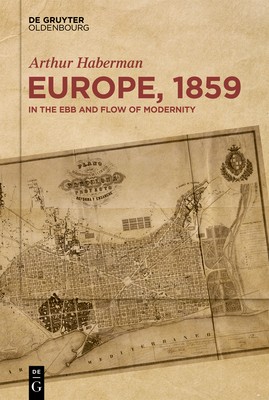
- Mēs nosūtīsim 10-14 darba dienu laikā.
- Autors: Arthur Haberman
- Izdevējs Walter de Gruyter
- Gads: 2022
- Lapas: 280
- ISBN-10 : 3110792842
- ISBN-13 : 9783110792843
- Formāts: 15.6 x 23.4 x 1.4 cm, kieti viršeliai
- Valoda: Anglų
- Extra -10% atlaide, ievadot kodu: EXTRA
Atsauksmes
Apraksts
In 1859, Charles Baudelaire is writing the poetry and criticism of the new urban cultural and social world which would make him described by a number of historians as the first modern. Indeed, it is he who coined the term 'modernity'. In the east, Ivan Turgenev with On the Eve begins reflections about Russia and modernity which would result in his next novel, set in 1859, Fathers and Sons. The latter still resonates today. In Switzerland, Jacob Burckhardt is inventing the Renaissance as a means of understanding what is happening in his own time. Indeed, we never talked about a Renaissance until Burckhardt published his The Civilization of the Renaissance in Italy in 1860, something he wrote in order to better understand his own times. In the West, several important and central works of European culture are being written in England by both British writers and exiles. Marx is researching Das Capital and writing A Contribution to the Critique of Political Economy. Mazzini is writing his major work on modern nationalism, The Duties of Man, just as Italy is beginning its decade of unification and the European map is beginning a period of extraordinary change. John Stuart Mill published his On Liberty in early 1859, still the work that is the modern ground of democratic ideas dealing with the relationship between liberty and authority. And in November 1859 one of the dozen or so most influential works of all of European history and science, one that shattered many pre-modern concepts, The Origin of Species, was published by Charles Darwin.
The thinkers who were prominent at the time were, in a full sense, public intellectuals. Their works were read, debated, applauded, feared, defended and scorned in the public forums, what philosophers sometimes called the marketplace.
It was in 1859 that modernity, the world as we now know it, gets confronted and encountered. As a result concepts and ideas we still use, then new, get thought about and become part of the public discourse. From this point on, the dialogue is forever transformed.
10 EXTRA % atlaide
Kupona kods: EXTRA
Akcija beidzas 7d.08:16:21
Atlaides kods derīgs pirkumiem no 10 €. Atlaides nav kumulatīvas.
Derīgs tikai pirkumiem tiešsaistē.

- Autors: Arthur Haberman
- Izdevējs Walter de Gruyter
- Gads: 2022
- Lapas: 280
- ISBN-10: 3110792842
- ISBN-13: 9783110792843
- Formāts 15.6 x 23.4 x 1.4 cm, kieti viršeliai
- Valoda: Anglų
In 1859, Charles Baudelaire is writing the poetry and criticism of the new urban cultural and social world which would make him described by a number of historians as the first modern. Indeed, it is he who coined the term 'modernity'. In the east, Ivan Turgenev with On the Eve begins reflections about Russia and modernity which would result in his next novel, set in 1859, Fathers and Sons. The latter still resonates today. In Switzerland, Jacob Burckhardt is inventing the Renaissance as a means of understanding what is happening in his own time. Indeed, we never talked about a Renaissance until Burckhardt published his The Civilization of the Renaissance in Italy in 1860, something he wrote in order to better understand his own times. In the West, several important and central works of European culture are being written in England by both British writers and exiles. Marx is researching Das Capital and writing A Contribution to the Critique of Political Economy. Mazzini is writing his major work on modern nationalism, The Duties of Man, just as Italy is beginning its decade of unification and the European map is beginning a period of extraordinary change. John Stuart Mill published his On Liberty in early 1859, still the work that is the modern ground of democratic ideas dealing with the relationship between liberty and authority. And in November 1859 one of the dozen or so most influential works of all of European history and science, one that shattered many pre-modern concepts, The Origin of Species, was published by Charles Darwin.
The thinkers who were prominent at the time were, in a full sense, public intellectuals. Their works were read, debated, applauded, feared, defended and scorned in the public forums, what philosophers sometimes called the marketplace.
It was in 1859 that modernity, the world as we now know it, gets confronted and encountered. As a result concepts and ideas we still use, then new, get thought about and become part of the public discourse. From this point on, the dialogue is forever transformed.

Atsauksmes